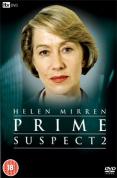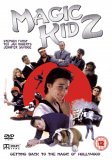 Prime Suspect 2 | DVD | (06/11/2006)
from £4.24
| Saving you £10.01 (335.91%)
| RRP
Prime Suspect 2 | DVD | (06/11/2006)
from £4.24
| Saving you £10.01 (335.91%)
| RRP A year after proving that she can handle a murder enquiry as well as any man D.C.I. Tennison is launched back into battle at Scotland Yard. The body of a young girl is discovered in a shallow grave in the back garden of a terraced house in an Afro-Carribean neighbourhood of London. The difficult job of identifying the body and finding the murderer is only made worse when the controversial subject of racism rears its ugly head. Having to contend with prejudice and misunderstanding from both the locals and from within her own team and dealing with a boss who has one eye on his own promotion D.C.I. Tennison has to use her powers of ingenuity courage and compassion as she faces the political disapproval of the public and her colleagues.
![Oliver Twist -- Special Edition [1948]](/pictures/1009830.jpg) Oliver Twist -- Special Edition | DVD | (26/09/2008)
from £9.99
| Saving you £6.00 (60.06%)
| RRP
Oliver Twist -- Special Edition | DVD | (26/09/2008)
from £9.99
| Saving you £6.00 (60.06%)
| RRP There have been many film and TV adaptations of Oliver Twist but this 1948 production from director David Lean remains the definitive screen interpretation of the Charles Dickens classic. From the ominous symbolism of its opening storm sequence (in which Oliver's pregnant, ill-fated mother struggles to reach shelter before childbirth) to the mob-scene climax that provokes Bill Sikes's dreadful comeuppance, this breathtaking black-and-white film remains loyal to Dickens while distilling the story into its purest cinematic essence.Every detail is perfect--Lean even includes a coffin-shaped snuffbox for the cruel Mr. Sowerberry--and as young Oliver, eight-year-old John Howard Davies (who would later produce Monty Python's Flying Circus for the BBC) perfectly expresses the orphan's boyish wonderment, stern determination and waifish vulnerability. Best of all is Alec Guinness as Fagin, so devious and yet so delightfully appealing under his beak-nosed (and, at the time, highly controversial) make-up. (Many complained that Fagin's huge nose and greedy demeanour presented an anti-Semitic stereotype, even though Lean never identifies Fagin as Jewish; for this reason, the film wasn't shown in the US until three years after its British release.) Likewise, young Anthony Newley is artfully dodgy as Fagin's loyal accomplice, the Artful Dodger. Guinness's performance would later provide strong inspiration for Ron Moody's equally splendid portrayal of Fagin in the Oscar-winning Oliver! and while that 1968 musical remains wonderfully entertaining, it is Lean's film that hews closest to Dickens' vision. The authentic recreation of 19th-century London is marvellous to behold; Guy Green's cinematography is so shadowy and stylised that it almost qualifies as Dickensian film noir. Lean is surprisingly blunt in conveying Dickens's theme of cruelty but his film never loses sight of the warmth and humanity that Oliver embodies. --Jeff Shannon
![The Bee Gees - One Night Only (DTS Version) [1998]](/pictures/1027302.jpg) The Bee Gees - One Night Only (DTS Version) | DVD | (29/05/2000)
from £9.00
| Saving you £5.99 (66.56%)
| RRP
The Bee Gees - One Night Only (DTS Version) | DVD | (29/05/2000)
from £9.00
| Saving you £5.99 (66.56%)
| RRP Taped as a lavish cable television special in 1997, One Night Only trades on the Bee Gees' shape-shifting career as pop survivors. Over the course of 111 minutes, this straightforward concert, produced at the MGM Grand in Las Vegas and groomed for both video and CD posterity, sprints through 31 songs from their past three decades. Even after the inevitable disco jokes are expended, and the jaundiced viewer contemplates the role hats, hairspray, and comb-overs now play in dressing the once stylishly long-haired troika, the Gibb brothers' signature vocal harmonies and hook-laden song craft beg respect.Casual listeners can't be blamed for equating the Bee Gees with the dance floor bonanza they reaped through 1978's Saturday Night Fever, yet that commercial zenith was actually the culmination of a comeback for a group that had seemed washed up by the early 1970s. One Night Only thankfully takes an even-handed view of both their original late 1960s hits ("Massachusetts", "To Love Somebody", "Lonely Days"), building from a cannily Beatle-browed vocal sound, and the 1970s blue-eyed soul ("Jive Talkin'", "Nights on Broadway") that led them naturally into disco. The Fever hits are here, as are Gibb originals that clicked for other acts; the family circle also widens for a posthumous duet with their late brother, Andy Gibb, while Celine Dion gets star billing in the collaborative "Immortality". --Sam Sutherland
![The Bee Gees - One Night Only [1998]](/pictures/1027273.jpg) The Bee Gees - One Night Only | DVD | (09/10/2000)
from £25.00
| Saving you £-5.01 (N/A%)
| RRP
The Bee Gees - One Night Only | DVD | (09/10/2000)
from £25.00
| Saving you £-5.01 (N/A%)
| RRP Taped as a lavish cable television special in 1997, One Night Only trades on the Bee Gees' shape-shifting career as pop survivors. Over the course of 111 minutes, this straightforward concert, produced at the MGM Grand in Las Vegas and groomed for both video and CD posterity, sprints through 31 songs from their past three decades. Even after the inevitable disco jokes are expended, and the jaundiced viewer contemplates the role hats, hairspray, and comb-overs now play in dressing the once stylishly long-haired troika, the Gibb brothers' signature vocal harmonies and hook-laden song craft beg respect.Casual listeners can't be blamed for equating the Bee Gees with the dance floor bonanza they reaped through 1978's Saturday Night Fever, yet that commercial zenith was actually the culmination of a comeback for a group that had seemed washed up by the early 1970s. One Night Only thankfully takes an even-handed view of both their original late 1960s hits ("Massachusetts", "To Love Somebody", "Lonely Days"), building from a cannily Beatle-browed vocal sound, and the 1970s blue-eyed soul ("Jive Talkin'", "Nights on Broadway") that led them naturally into disco. The Fever hits are here, as are Gibb originals that clicked for other acts; the family circle also widens for a posthumous duet with their late brother, Andy Gibb, while Celine Dion gets star billing in the collaborative "Immortality". --Sam Sutherland
![Oliver Twist [1948]](/pictures/1010464.jpg) Oliver Twist | DVD | (11/10/1999)
from £6.39
| Saving you £3.60 (56.34%)
| RRP
Oliver Twist | DVD | (11/10/1999)
from £6.39
| Saving you £3.60 (56.34%)
| RRP There have been many film and TV adaptations of Oliver Twist but this 1948 production from director David Lean remains the definitive screen interpretation of the Charles Dickens classic. From the ominous symbolism of its opening storm sequence (in which Oliver's pregnant, ill-fated mother struggles to reach shelter before childbirth) to the mob-scene climax that provokes Bill Sikes's dreadful comeuppance, this breathtaking black-and-white film remains loyal to Dickens while distilling the story into its purest cinematic essence.Every detail is perfect--Lean even includes a coffin-shaped snuffbox for the cruel Mr. Sowerberry--and as young Oliver, eight-year-old John Howard Davies (who would later produce Monty Python's Flying Circus for the BBC) perfectly expresses the orphan's boyish wonderment, stern determination and waifish vulnerability. Best of all is Alec Guinness as Fagin, so devious and yet so delightfully appealing under his beak-nosed (and, at the time, highly controversial) make-up. (Many complained that Fagin's huge nose and greedy demeanour presented an anti-Semitic stereotype, even though Lean never identifies Fagin as Jewish; for this reason, the film wasn't shown in the US until three years after its British release.) Likewise, young Anthony Newley is artfully dodgy as Fagin's loyal accomplice, the Artful Dodger. Guinness's performance would later provide strong inspiration for Ron Moody's equally splendid portrayal of Fagin in the Oscar-winning Oliver! and while that 1968 musical remains wonderfully entertaining, it is Lean's film that hews closest to Dickens' vision. The authentic recreation of 19th-century London is marvellous to behold; Guy Green's cinematography is so shadowy and stylised that it almost qualifies as Dickensian film noir. Lean is surprisingly blunt in conveying Dickens's theme of cruelty but his film never loses sight of the warmth and humanity that Oliver embodies. --Jeff Shannon
 Magic Kid 2 | DVD | (05/07/2005)
from £5.99
| Saving you £-2.00 (N/A%)
| RRP
Magic Kid 2 | DVD | (05/07/2005)
from £5.99
| Saving you £-2.00 (N/A%)
| RRP Kevin a martial arts expert has become a teen Hollywood heartthrob but wants to quit. The studio's attempts to stop him lead to hilarious consequences.
 The Bee Gees - One Night Only / The Official Story Of The Bee Gees | DVD | (26/09/2005)
from £N/A
| Saving you £N/A (N/A%)
| RRP
The Bee Gees - One Night Only / The Official Story Of The Bee Gees | DVD | (26/09/2005)
from £N/A
| Saving you £N/A (N/A%)
| RRP Taped as a lavish cable television special in 1997, One Night Only trades on the Bee Gees' shape-shifting career as pop survivors. Over the course of 111 minutes, this straightforward concert, produced at the MGM Grand in Las Vegas and groomed for both video and CD posterity, sprints through 31 songs from their past three decades. Even after the inevitable disco jokes are expended, and the jaundiced viewer contemplates the role hats, hairspray, and comb-overs now play in dressing the once stylishly long-haired troika, the Gibb brothers' signature vocal harmonies and hook-laden song craft beg respect.Casual listeners can't be blamed for equating the Bee Gees with the dance floor bonanza they reaped through 1978's Saturday Night Fever, yet that commercial zenith was actually the culmination of a comeback for a group that had seemed washed up by the early 1970s. One Night Only thankfully takes an even-handed view of both their original late 1960s hits ("Massachusetts", "To Love Somebody", "Lonely Days"), building from a cannily Beatle-browed vocal sound, and the 1970s blue-eyed soul ("Jive Talkin'", "Nights on Broadway") that led them naturally into disco. The Fever hits are here, as are Gibb originals that clicked for other acts; the family circle also widens for a posthumous duet with their late brother, Andy Gibb, while Celine Dion gets star billing in the collaborative "Immortality". --Sam Sutherland

Please wait. Loading...
This site uses cookies.
More details in our privacy policy